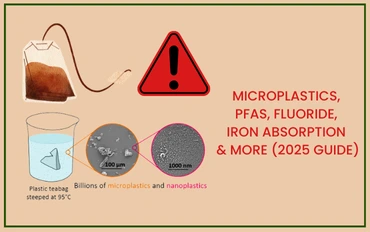Side Effects of Tea Bags: The Hidden Truth You Should Know (With a Healthier Alternative)
Introduction: A Cup of Comfort or a Cup of Concern?
For billions of people, drinking tea is a daily ritual. Whether it’s black tea in the morning, green tea for health, or herbal tea before bed, this ancient beverage is tied to culture, wellness, and relaxation. But what if your soothing cup hides invisible risks?
Recent studies suggest that tea bags themselves—not just the tea leaves—may pose health concerns. From microplastics to pesticide residues, the side effects of tea bags are gaining attention worldwide.
This article explores scientific research, facts, and practical advice so you can make an informed choice about your tea habit.
What Are the Main Side Effects of Tea Bags?
Tea bags may look harmless, but research highlights five possible risks:

- Microplastics & Nanoplastics – Many tea bags release billions of plastic particles when steeped in hot water.
- Chemical Additives – Heat-sealed tea bags may leach adhesives, polymers, or PFAS-like substances.
- Pesticide Residues – Some teas contain chemical residues from farming practices.
- Heavy Metals & Contaminants – Soil pollution can lead to lead, cadmium, or arsenic in tea leaves.
- Processing Byproducts – Acrylamide and PAHs may form during roasting or drying.
1. Do Tea Bags Release Microplastics?
Yes — and the numbers are shocking.
A 2019 study found that a single plastic tea bag steeped at 95°C released around 11.6 billion microplastic particles and 3.1 billion nanoplastic particles into one cup of tea.
These tiny plastics are invisible to the naked eye but measurable under electron microscopes. While not every tea bag releases the same amount, nylon pyramid bags and heat-sealed bags are the worst offenders.
2. Can Microplastics Enter the Human Body?
Unfortunately, yes.
Recent biomonitoring studies detected microplastics in human blood, placenta, lungs, and even brain tissue. While it’s difficult to trace exposure to one source (air, bottled water, or food packaging), tea bags are now recognized as a direct ingestion pathway.
Scientists warn that microplastics may:
- Trigger inflammation and oxidative stress
- Disrupt the gut microbiome
- Carry toxic chemicals or pesticides into the body
Though research is ongoing, experts recommend minimizing avoidable plastic exposures.
3. Tea Bags and Chemical Additives
Not all tea bags are made equal.
- Nylon / PET mesh bags: Common for “premium” pyramid-shaped tea bags.
- Heat-sealed paper bags: Often contain polypropylene plastic strips to hold the bag together.
- PFAS concerns: Some tea bags may have non-stick or water-resistant coatings.
These substances can leach trace chemicals into your tea, especially when steeped in boiling water.
4. Pesticides in Tea Bags
Tea plants absorb chemicals used in conventional farming. A 2022 multi-country survey detected multiple pesticide residues in over 60% of tested tea samples.
While most samples complied with maximum residue limits, chronic exposure is a concern. Some pesticides are linked to:
- Hormonal imbalance
- Neurological effects
- Reproductive issues
5. Heavy Metals & Processing Contaminants
Tea leaves can accumulate lead, arsenic, and cadmium from polluted soils. Prolonged exposure, even at low levels, may increase risks of kidney, bone, or nervous system problems.
Additionally, when tea is roasted or dried, compounds like acrylamide may form. These are classified as “probable carcinogens” in large doses.
6. Health Effects: What Science Says
Currently, no direct study proves that tea bags cause specific human diseases. However:
- Animal studies show microplastics disrupt reproduction, immunity, and digestion.
- Human tissue studies confirm plastics can cross biological barriers.
- Long-term exposure to pesticides and heavy metals is already linked to chronic illness.
So, while a single cup of tea won’t harm you, repeated daily exposure over years may add up.
7. How to Reduce Side Effects of Tea Bags
Here are evidence-based tips:
✅ Choose loose-leaf tea with a stainless steel or bamboo infuser
✅ Buy plastic-free tea bags labeled compostable or unbleached
✅ Avoid nylon or silky pyramid bags
✅ Steep at slightly lower temperatures (not boiling)
✅ Opt for organic-certified teas to reduce pesticide exposure
✅ Rotate tea brands and origins to diversify sources
8. Should You Stop Drinking Tea?
No. Tea itself offers tremendous health benefits: antioxidants, polyphenols, heart protection, and brain support.

Nature Zenith’s Solution: Green Vital (Green Tea in Tablet Form)
After learning about the side effects of tea bags, the next question is: What’s a safer alternative?
Introducing Green Vital – Your Healthier Green Tea Choice
Nature Zenith Green Vital is a premium green tea in tablet form, created for modern lifestyles. It gives you all the benefits of green tea, without the side effects of tea bags.
✅ Made with 12 Natural Ingredients: Green Tea, Garcinia Cambogia, Tulsi, Lemon, Cinnamon, Chamomile, Rose Petals & more.
✅ No Plastics, No Chemicals: Pure herbal formulation, safe and toxin-free.
✅ Convenient Tablet Form: Easy to carry, no brewing hassles, no tea bags.
✅ Boosts Metabolism & Detox: Supports weight management, digestion, and energy.
✅ Eco-Friendly: No plastic waste from tea bags.
9. Why Switch to Green Vital Instead of Tea Bags?
| Tea Bags | Nature Zenith’s Green Vital |
|---|---|
| May contain plastic & chemicals | 100% herbal & safe |
| Releases microplastics in hot water | Zero microplastics |
| Environmental waste | Eco-friendly |
| Takes time to brew | Quick, easy tablet |
| Limited ingredients | Enriched with 12 powerful herbs |
10. FAQs About Side Effects of Tea Bags
Q1: Do tea bags release plastic into tea?
Yes, studies show billions of plastic particles can leach into hot water from nylon or plastic-sealed tea bags.
Q2: Are paper tea bags safe?
Safer, but check if they’re “plastic-free” — many paper bags still contain heat-sealed plastics.
Q3: Should I avoid all tea bags?
Not necessary. Just avoid plastic-based ones and switch to compostable or loose-leaf options.
Q4: What are the long-term side effects of tea bags?
Potential risks include exposure to microplastics, pesticide residues, and heavy metals, which may contribute to inflammation, hormonal disruption, or chronic disease risk.
Q5: What is the healthiest alternative to tea bags?
Loose-leaf organic tea or herbal tea in tablet form (like Green Vital by Nature Zenith), which avoids plastic and chemical contamination.
11. Conclusion: A Smarter Way to Drink Tea
Tea is often seen as a healthy drink, but hidden dangers in tea bags make it a potential health risk. From microplastics to chemical exposure and environmental harm, the truth about tea bags is alarming.
Thankfully, you don’t have to give up tea’s benefits. With Nature Zenith Green Vital (Green Tea in tablet form), you get the same refreshing boost and health benefits – without toxins, plastics, or waste.
💡 It’s time to make the switch – for your health and the planet.









Add comment